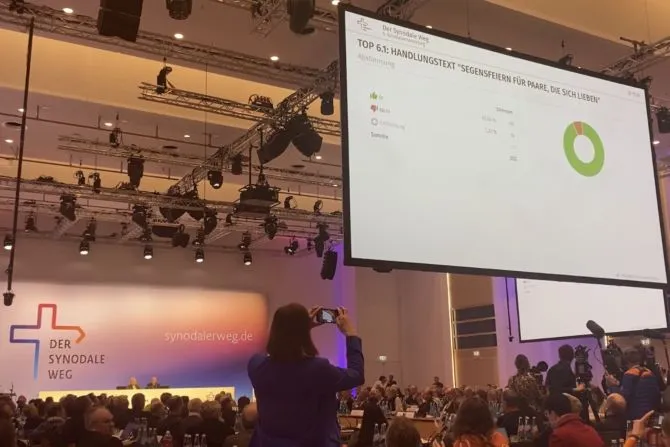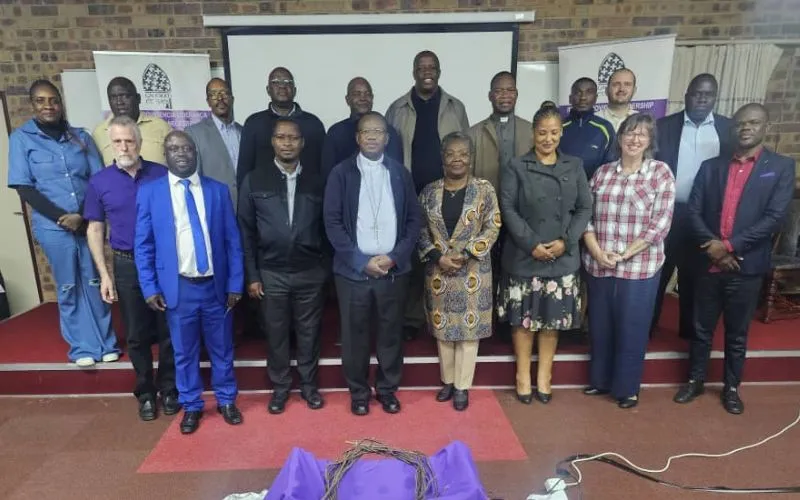“The bishops commission the pastoral staff to preach at the eucharistic celebration” as part of their ecclesial mission, “so that they can carry out their preaching service officially and in the name of the Church,” reads the adopted text, titled, “Proclamation of the Gospel by laypeople in word and sacrament.”
During floor debate, Bishop Ansgar Puff, an auxiliary bishop of Cologne, said that while he approved of laypeople providing scriptural reflections outside of the Mass, “the homily and the presiding of the Eucharist belong together.”
But the bishop was immediately countered by Bishop Peter Kohlgraf of Mainz, who said he had grown up in Cologne at a time when lay preaching was practiced and “it never hurt anyone.”
Several religious sisters also called for lay preaching and sacramental faculties. One even suggested that women in her religious community would not go to a priest for confession because they wanted to engage in the sacrament with someone who could “accompany them.”
The previous day, the assembly approved a measure to ask Pope Francis “to reconsider the link between the conferral of ordinations and the obligation to be celibate.” The measure received support from 44 bishops out of 60. Eleven abstained, while only five voted no.
(Story continues below)
A fierce debate preceded the final vote over whether the Synodal Way should ask the Holy Father to “reexamine” or “rescind” the discipline of priestly celibacy.
Some voices argued that failing to demand an end to the requirement would not be strong enough, but adopting “reexamine” ultimately prevailed.
“We need to be smart,” said Cardinal Reinhard Marx of Munich, suggesting that the “reexamine” language was the best option for both having the measure adopted by the synodal assembly and being considered by Pope Francis.
None of the measures adopted by the Synodal Way have any binding effect in the dioceses of Germany without implementation by the local ordinary. However, observers believe that the measures will likely be implemented in most dioceses, in some cases because bishops support them, but in others due to intense pressure upon bishops from Church employees, Catholic media, and even brother bishops.
A “base text” expressing views on the priesthood that included the claim that “gender-based admission to the priesthood … is discriminatory and must be abolished” was also passed on Thursday. A vote on a related implementation text calling for women’s ordination did not take place on Friday morning due to time constraints. It will be taken up by the synodal committee, a transitory body tasked with establishing the parameters of the permanent synodal council. Synodal committee members are scheduled to be elected tomorrow.
Opening press conference sets tone
The stage for the assembly was set with an opening press conference on March 9 with members of the Synodal Way’s presidium, or leadership council.
“We want to make this Church fit for the future,” said Irme Stetter-Karp, president of the powerful Central Committee of German Catholics (Zdk), which is co-implementing the Synodal Way with the German Bishops’ Conference (DBK).
Presidium members also addressed a recent slew of defections from the Synodal Way. Four laywomen left the process in late February, stating that adopted resolutions were incompatible with the Catholic faith and cast doubt “on central Catholic doctrine and beliefs.” A priest of the Archdiocese of Cologne also resigned from the Synodal Way, criticizing the process for having a prearranged agenda and limiting debate.
“The will to and ability to integrate has limits,” said Stetter-Karp, implying that those who left the process did not have open minds or a willingness to participate by the established rules.
But minutes after Stetter-Karp’s comments about abiding by the rules, Thomas Söding, vice president of Zdk, stated that his group would “not accept” the assembly outcomes if proposals failed to receive the necessary support of two-thirds of the voting bishops.
At the previous synodal assembly in September, a text that affirmed a vision of human sexuality contrary to the Catholic faith failed to pass after 22 of 55 bishops voted against it. In response, organizers altered procedural rules to make voting public, a practice that continued for the fifth assembly.
Stetter-Karp also said that she expected more transparency from bishops “in communicating their own convictions,” discouraging bishops from abstaining from voting.








